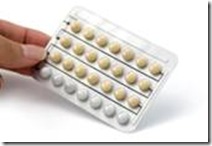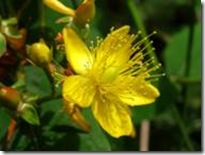Sixteen healthy women who had taken a low dose oral contraceptive (OC) with 20 mcg ethinylestradiol + 0.15 mg desogesterol for at least 3 months participated in this study. A 50% ethanol extract of St. John’s wort 250 mg twice daily standardized to 0.2% hypericin (1 mg/day) and < 0.2%(< 1mg/day) hyperforin was initiated day 7 through day 21 of the of the OC administration. Blood samples were taken on day 7 and 14. The activities of CYP3A4 for the estrogen metabolism, and CYP2C19 and CYP2D6 for the progestin metabolism were used to measure metabolism of the OC and interaction of the OC with St. John’s wort. Results demonstrated that co-medication of the St. John’s wort extract with the oral contraceptive did not elicit any differences in the pharmacokinetic measures of ethinylestradiol in this study.
 The pharmacokinetics of the desogestrol was also not affected by co-administration of the St. John’s wort extract. There was a small decrease in ethinylestradiol and 3- ketodesogestrel but it was not considered significant. In addition, there was no break through bleeding induced by the addition of the St. John’s wort extract.[1]
The pharmacokinetics of the desogestrol was also not affected by co-administration of the St. John’s wort extract. There was a small decrease in ethinylestradiol and 3- ketodesogestrel but it was not considered significant. In addition, there was no break through bleeding induced by the addition of the St. John’s wort extract.[1]
Comments
The results of this study are in contrast to other previous reports and studies. Two reports have shown break-through bleeding and spotting with co-administration of St. John’s wort and OCs.[2],[3]
 Three studies indicate an alteration of the pharmacokinetics of the OC with co-administration of St. John’s wort. [4], [5], [6] These studies used a different St. John’s wort preparation (80% methanolic extract) and at a much higher dose (900 mg) containing a much higher amount of hyperforin (20-35 mg) than the current study.
Three studies indicate an alteration of the pharmacokinetics of the OC with co-administration of St. John’s wort. [4], [5], [6] These studies used a different St. John’s wort preparation (80% methanolic extract) and at a much higher dose (900 mg) containing a much higher amount of hyperforin (20-35 mg) than the current study.
The lower daily total dose and hyperforin intake would appear to be the likely reason for the lack of interaction of the St. John’s wort extract with the OC pharmacokinetics in this current study. Accordingly, using a lower dose St. John’s wort extract with reduced hyperforin content does not appear to interact with OC nor cause breakthrough bleeding (an indication of possible ovulation).
References
[1] Will-Shahab L, Bauer S, Kunter U. St John’s wort extract (Ze 117) does not alter the pharmacokinetics of a low-dose oral contraceptive. Eur J Clin Pharmacol 2009; 65:287-294.
[2] Ernst E. Second thoughts about safety of St. John’s wort. Lancet 1999;354:2014-2016.
[3] Raetz A, vonMoos M, Drewe J. Johanniskraut: ein Phytopharmakon mit potentiell gefahrlichen Interaktionen. Praxis 2001;90:843-849.
[4] Pfrunder A, Schiesser M, Gerber S, et al. Interaction of St. John’s wort with low-dose oral contraceptive therapy: a randomized controlled trial. Br J Clin Pharmacol 2003;56:683-690
[5] Hall S, Wang Z, Huang S, Hamman M, et al. The interaction between St. John’s wort and an oral contraceptive. Clin Pharmacol Ther 2003; 74:525-535.
[6] Murphy P, Kern S, Stanczyk F, Westhoff C. Interaction of St. John’s wort with oral contraceptives: effects on the pharmacokinetics of norehindrone and ethinyl estradiol, ovarian activity and breakthrough bleeding. Contraception 2005;71:402-408

